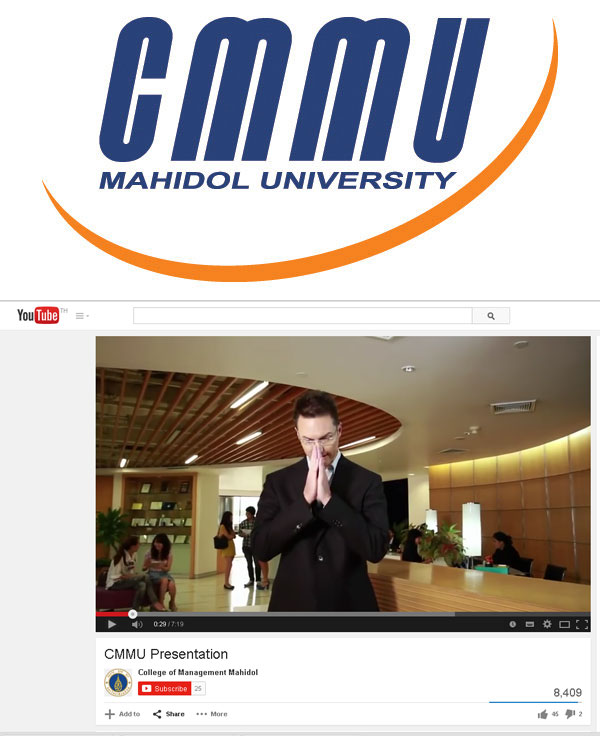
The College of Management, Mahidol University held the 2014 CMMU Showcase at its campus in Bangkok on Sunday, September 21, 2014. More than 200 alumni, faculty members, students and invited guests were in attendance at the event that underlines the CMMU’s commitment to quality of business education, breadth of knowledge and variety of student interests. Business, Knowledge and Variety were the operative words.
A lot of effort had gone into organizing this academic conference, which featured top-notch industry speakers, who shared insightful comments and valuable insider perspective on key strategic planning and management issues. Outstanding academic works by alumni were also highlighted alongside thought-provoking presentations on a wide range of topics by Master’s students.
[wzslider] Knowledge sharing as public service
Knowledge sharing as public service
In his opening remarks, Associate Professor Dr. Annop Tanlamai, Dean of the CMMU, said the Showcase event was consistent with the founding principle of the CMMU, which stays true to the vision of Mahidol University’s namesake, Prince Mahidol, who eloquently asserted that “True success is not in the learning, but in its application to the benefit of mankind”.
“The aim of CMMU Showcase is to share in-house knowledge generated by our faculty members, staff researchers and Master’s students to the wider society,” Dr. Annop said, adding that this knowledge takes the forms of research/consulting works, student theses, dissertations and degree projects, which add up to about 500 each year.
Music industry at digital crossroads
CMMU Showcase kicked off with industrial leaders’ talk on “The Future of Music Media Management”, which proved to be a crowd-pleaser. As Mr. Supachai Nilawan, Senior Vice President of RS Public Company Limited, and Ms. Pornthip Kongchun, Head of Marketing of Google and Youtube in Thailand, took the stage, it became obvious to members of the audience that this was going to be an excellent opportunity for learning on so many levels.
When the full impact of digitization on the music industry triggered the nightmare scenario, the question on everybody’s mind was not whether consumers would eventually stop buying cassette tape and CD albums – but when. There wasn’t any element of surprise to it when that finally happened, recalled Mr. Supachai.
The writing had been on the wall. For several years leading up to around 2005, consumers had increasingly been drawn to downloadable, shareable digitized music widely available on the Internet instead of going to record shops to buy music in cumbersome physical formats.
Disruptive innovation
“It was mostly with bitterness that we in the music industry first reacted to what happened,” Mr. Supachai said, referring to the passing of an era in Thailand’s music industry when, in management parlance, a disruptive technological innovation unleashed a radical change in consumer behavior and expectations.
It was a game changer. Consumers no longer rely on record companies to produce, promote and then ship music to them in physical formats. The likes of Google search engine and Youtube video-sharing platform have made it easy for consumers to discover and enjoy music, video and other contents on the computer screen, smartphone or any other connected electronic devices, in addition to the traditional channels, like the radio and TV.
Rethinking business model
“RS made a 360-degree turn after a thorough rethink of our business model,” Mr. Supachai said.
The record company has since been transformed into a full-fledged entertainment powerhouse, comprising music, show business and media, supplying contents on digital, satellite and cable television channels, on radio and online.
Win-win partnership
For a time, Mr. Supachai said Youtube continued to be seen by the music industry as one of the biggest threats.
All this has changed. With the recent launch of Youtube Partner Program in Thailand, Ms. Pornthip said Youtube had emerged as a potential partner to original content creators, from big corporations, like RS, to talented individuals.
“Original content providers should find our transparent revenue-sharing schemes attractive as they will enable them to monetize their intellectual properties – knowledge, skills and abilities,” she said.
New value network
Popular Youtube videos are now supported by a pre-roll ad that users can opt to skip after a few seconds. The advertisers are charged only when someone chooses to watch their ads.
“Without advertisements, there is no incentive for original content creators to continue to be creative, and Youtube users will not get to watch quality contents,” the chief marketer of Youtube Thailand said.
Lessons learned
Mr. Supachai couldn’t agree more. Under the new business model, RS generates less revenue from music sales in physical and digital formats of any given artist, “But that shortfall is more than made up by our share of advertising income on Youtube, ticket sales from concert tours, fees from celebrity endorsement deals and proceeds from paid-for contents for TV.”
That summed up the industry speakers’ talk, which was illuminating and entertaining in equal measure.
Next up, CMMU alumni and current Master’s students competed among themselves to attract audience members to their presentation sessions that took place simultaneously in separate meeting rooms. More than 20 works, representing a wide cross section of studies, academic exercises and practical solutions undertaken by the students, were highlighted. Each of them reflected the youthful enthusiasm and creative mind of a budding manager or entrepreneur.
A global perspective on entrepreneurship
Notable among Master’s student presentations was “Global Entrepreneurship: Lei Jun and Xiaomi Tech”. Tawan Chumintarachak and Akaradesh Chootrakool offered an engaging analytical account of how Lei Jun and his four-year-old mobile handset company beat mighty Samsung to become the best-selling smartphone brand in China.
The Chinese entrepreneur’s core ideas revolve around his determination to offer a range of smartphones with higher-end specifications at the most attractive price points. Lei Jun took advantage of the void left in the Android platform by Google’s exit from China market by substituting the world’s most popular search engine and other apps with homegrown third-party ones that provide his company extra incomes to offset thin margins on Xiaomi handset sales.
The use of guerrilla tactics to cultivate a dedicated and loyal fan base also helped in his unusual marketing and publicity stunts, the students concluded.
Spotlight on local hair salon business
“Successful Salon Business Model” was an interesting fact-finding exercise by a group of students to try to pinpoint factors contributing to success of Bangkok’s top hair salons. The group chose Grounded Theory method, starting with collecting and analyzing data to identify a set of keywords from which categories were then formed.
The study was based on interviews of salon managers, customers, hair styling experts and an entrepreneur who helped build up a successful hairstyling salon franchise as well a broad survey of published articles in popular magazines and relevant video clips shared on the Internet.
The end result was a business model, complete with guideline on required personnel with desirable skill-sets, management tools and brand-building strategy that hopefully will help improve hair salon startups’ chance of success.
Fail-proof organic herb farm business plan
The current trends in beauty, personal care and dietary supplement products indicate that today’s health-conscious consumers look for products with organic herbs as key ingredients as alternative to synthetic materials. According to industry estimates, the combined value of domestic sales and exports to the international market for beauty, personal care and dietary supplement products in Thailand amounted to almost THB300 billion.
Overcoming cultural barrier to trade
The findings from the study, “Effects of Cultural Differences on Trading Business Between Thai & Japanese Companies”, emphasizes the need to cultivate cultural sensitivity among Thai traders and their Japanese counterparts in Japanese trading firms to overcome cultural barrier to trade and improve working relationships.
The ability to identify cultural differences, including national character traits and behavior pattern, is an important first step towards better understanding of factors, positive or negative, affecting business between Thai and Japanese traders. Pachara Worawutrangsan applied Hofstede’s cross cultural dimensions theory in this study.
Although Thais and Japanese belong to social hierarchical structure typical of Asian culture, there are cultural differences, real or perceived, that can potentially impede rather than facilitate trade. Based on the findings, Japanese traders in general are more risk-averse and organizational-oriented than their Thai counterparts, who are seen as less loyal to trading partners and lacking in clear, consistent communication skills.
The advice for Thais doing business with Japanese is to build on positive Thai cultural factors, including friendliness and intuitive personal skills, while avoiding negative ones, such as tendency to miscommunicate and low consistency in business dealings.
A rare glimpse into insider trading in Thai stock market
“Insider Trading Behavior and News Announcement: Evidence from the Stock Exchange of Thailand” by graduate student, Weerawan Laoniramai, won the 2012 Capital Market Research Scholarship for Graduate Students Award for her outstanding research paper, which offers a rare glimpse into the illegal practice in Thai capital market, characterized by low efficiency and lack of transparency.
The financial management study, based on exhaustive research of Stock Exchange of Thailand’s information base spanning 2000-2008, involving 490 listed companies, offers some obvious results as well as some very interesting, counterintuitive ones.
The more obvious facts include: the greater time lapse between a government’s or a company’s key decision affecting a company’s performance or prospects and the public disclosure of news, the more likely that insider information can be misused by unscrupulous corporate or individual traders.
Some of the more surprising findings include the fact that position of the insider trader within the hierarchy of the company had no bearing on the rate of the abnormal returns. The same was true with the different types of insider traders, corporate or individual, who reaped about the same rate of ill-gotten gains.
The study also says insider traders bought and accumulated a stock based on privileged information before news disclosure but usually did not sell at the highest prices perhaps to avoid raising suspicion.
A successful conclusion to academic seminar
The inaugural CMMU Showcase, which featured many more thought-provoking research works, succeeded in what it set out to do in providing a wealth of multi-disciplinary knowledge borne of problem-based learning and real-world solutions by students, faculty members and research staff.
“The CMMU takes pride in its unique privilege of being a leading institute of higher learning to share knowledge that is timely, relevant and actionable,” said Associate Professor Dr. Nathasit Gerdsri, Deputy Dean for Academic Programs.



